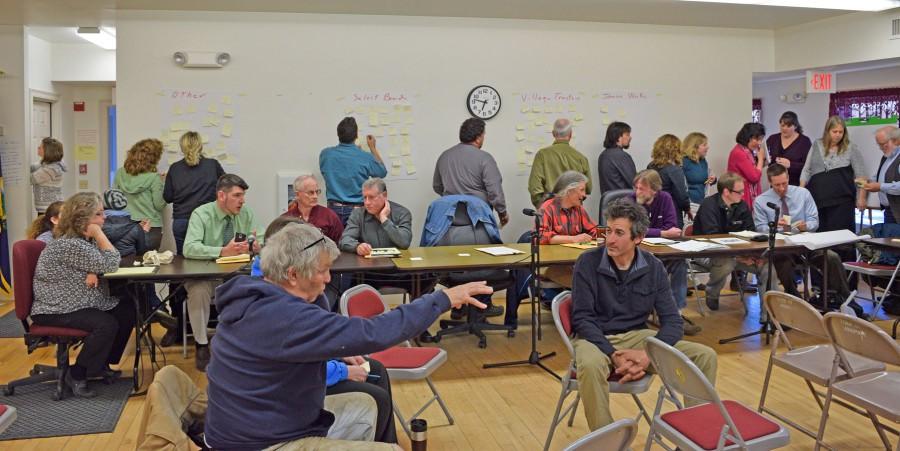Johnson town government seeks community involvement to address economic woes
The meeting at the Johnson Municipal Building
A joint meeting of the Johnson town select board, school board, village trustees, planning commission and Johnson Works was held on Tuesday, April 26, at the Johnson Municipal Building to cooperatively brainstorm ideas for raising the town out of its economic malaise.
“Johnson is the best town in the county to work in for wages, but people who live in the town have the lowest wages in the county,” said representative Mark Woodward just after the meeting. “There’s a disconnect… people who work at the college [and] people who work at Laraway live somewhere else.”
The idea for the meeting had arisen when members of the select board attended a prior school board meeting during which the correlation between poverty, crime, and low test scores was discussed.
Once the meeting convened, introductions were made and the concept of the meeting was made clear: this was to be an evening of collective brainstorming to address the myriad problems facing the town – among them a serious lack of housing for sale, low wages, an under-performing elementary school with poor test results, a lack of low-income housing, and a dearth of businesses.
Everyone then broke off into different groups: “Village Trustees,” “School Board,” “Johnson Works,” “Select Board,” and “Other” – with poster boards, markers, and sticky notes in hand – to come up with suggestions for their specific group.
The moderately sized room then filled with the sound of chatter, footsteps and the scrape of metal chairs as everyone went to work.
About 45 minutes later, the reports came. Hundreds of suggestions were made overall.
For the trustees, many of the suggestions were about incentivizing businesses to move to the town, increasing community engagement, concerns about low-income housing and developing a Johnson brand such as, “Where the Trails Meet.”
The school board focused on improving test results, getting kids involved in the community and better public relations.
Johnson Works suggested the need for facilitating more start up businesses and publicizing recreational trails.
The select board noted a wide array of priorities including providing a serious tax incentive for businesses, limiting rental properties, enforcing the derelict building ordinance, creating a neighborhood watch and/or increasing law enforcement, promoting Johnson State College events in the town, and improving communication through better meetings.
According to Walter Pomroy, a village trustee, the town has commissioned studies in the past which could potentially provide solutions to the current problems facing the town and village.
“People have already discussed [these same problems in the past] and had ideas,” said Pomroy. “What I’m trying to say is, you don’t have to reinvent the wheel. There’s some good stuff in [these past studies] on housing. Housing has been mentioned a lot. Guess what? We did a housing study in 2008. There’s a lot of information in here, ok? Believe it or not, one of the conclusions may surprise you all. It does say that we need more rental property, not less.”
“Tear it up,” responded a man from the floor, eliciting hearty laughter.
JSC’s role in the town was also a topic of discussion. “I’d like to hear a little bit from Elaine about how things are going at Johnson State College,” said representative Woodward. “We can’t forget that our community is really tied to the health of the college.”
JSC President Elaine Collins responded by pointing to growth areas such as the EDP program, a 27 percent increase in applications for the upcoming year and a 30 percent increase in endowments and fundraising over last year as signs that the college is on the right track.
And yet, she said, there are also headwinds.
“That said,” continued Collins, “I don’t want to give any false hope because at the same time that our enrollments are growing and our fiscal health is growing, things like the stressors on the system – the stress on the healthcare related to our employees – that’s also going up. Even with our gains, we’re constantly fighting some of those other increases. But I think, in general, we’re definitely moving in the right direction.”
Through the array of suggestions and vigorous discussion, one message came through loud and clear: Johnson needs citizens and other stakeholders – yes, students too – to engage with the issues and be part of the solution.
“I love this meeting,” said David Butler, chair of the planning commission. “I don’t think I’ve been in a planning meeting or a select board meeting that’s had so many people showing up. What I want you all to think about [is] this: if you all go home and bring three neighbors to the next meeting, maybe we can actually get people in this town to care. If we can get people in this town to care, we can do anything we want.”
A full listing of the suggestions made during the meeting, is available at http://townofjohnson.com/wp-content/uploads/2014/02/Johnson-Joint-Meeting-Minutes-4-26-16.pdf.



